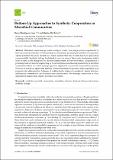Bottom-Up Approaches to Synthetic Cooperation in Microbial Communities
Author(s)
Rodríguez Amor, Daniel; Dal Bello, Martina
Downloadlife-09-00022.pdf (35.45Mb)
Terms of use
Metadata
Show full item recordAbstract
Microbial cooperation pervades ecological scales, from single-species populations to host-associated microbiomes. Understanding the mechanisms promoting the stability of cooperation against potential threats by cheaters is a major question that only recently has been approached experimentally. Synthetic biology has helped to uncover some of these basic mechanisms, which were to some extent anticipated by theoretical predictions. Moreover, synthetic cooperation is a promising lead towards the engineering of novel functions and enhanced productivity of microbial communities. Here, we review recent progress on engineered cooperation in microbial ecosystems. We focus on bottom-up approaches that help to better understand cooperation at the population level, progressively addressing the challenges of tackling higher degrees of complexity: spatial structure, multispecies communities, and host-associated microbiomes. We envisage cooperation as a key ingredient in engineering complex microbial ecosystems. Keywords: synthetic microbial communities; mutualism; cheaters; host-microbiome interactions;
synthetic ecology
Date issued
2019-02Department
Massachusetts Institute of Technology. Department of PhysicsJournal
Life
Publisher
Multidisciplinary Digital Publishing Institute
Citation
Rodríguez Amor, Daniel, and Martina Dal Bello. “Bottom-Up Approaches to Synthetic Cooperation in Microbial Communities.” Life, 9, 1 (February 2019): 22.
Version: Final published version
ISSN
2075-1729
Collections
The following license files are associated with this item: